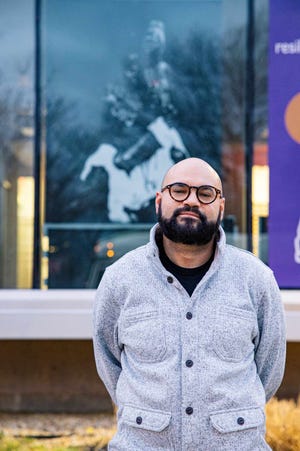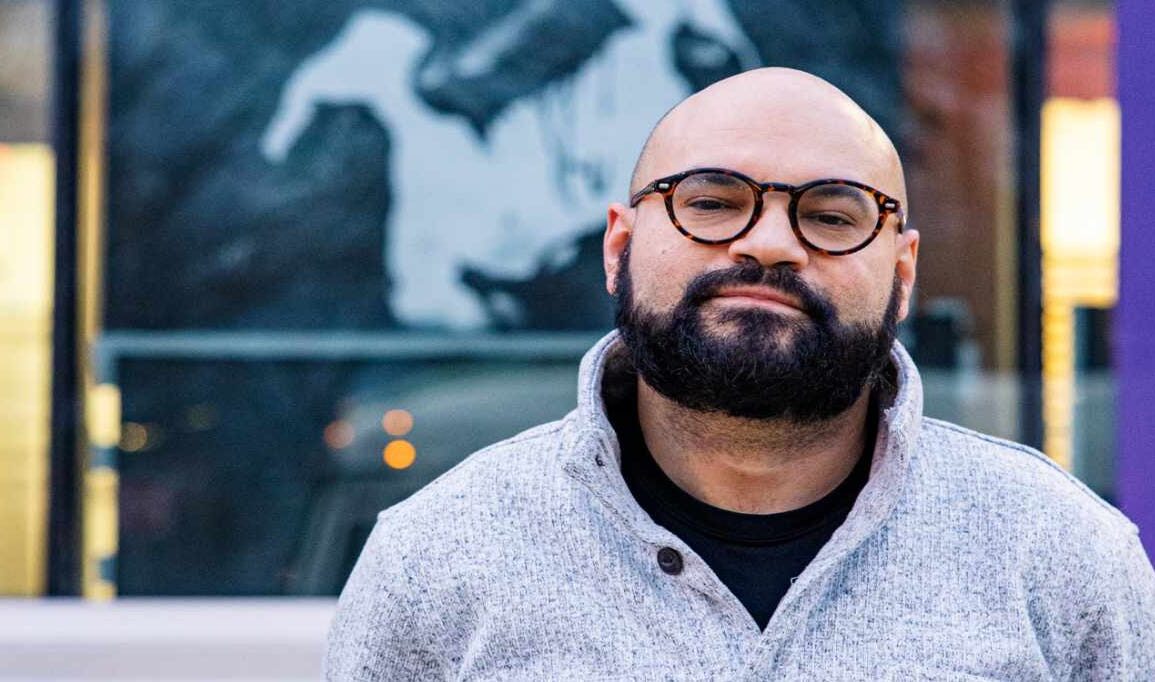
Every summer has a major news story so inescapable, it reaches local creative scenes.
This year, it’s a war of words between two of the most popular rappers alive, and it spurred Arlington artist and rapper TJ Reynolds to drop an experimental and potentially controversial album that took him only weeks to create, “AI LP.”
The rappers in question, Kendrick Lamar and Drake, have had bad blood for years, but Lamar brought it out into the open with a verse on producer Metro Boomin and rapper Future’s track “Like That” in March.
A few weeks later, Drake fired back with two diss tracks: “Push Ups,” where he insulted Lamar’s wife, Whitney Alford, and “Taylor Made Freestyle,” where he used an artificial intelligence voice changer to make two of his verses sound like they came from Snoop Dogg and Lamar’s biggest role model, the late, great Tupac Shakur.
Lamar responded with four diss tracks in five days, two of which called Drake out on using AI to disrespect Shakur’s legacy and one of which (“Not Like Us”) debuted at #1 on the Billboard Hot 100. He even organized what might have been the first ever diss concert, the Pop Out, which took place June 19 in Los Angeles.
More:After a health crisis, Lenny Clarke to lead triple bill of comics at Tuckerman Hall
More:Beyond the folk festival: Taking a family vacation in Newport, Rhode Island
Metro Boomin got in on it too, announcing a contest where he offered a free beat to any rapper who recorded an equally scathing Drake diss, but his contribution brought AI into the picture on Lamar’s side, too.
In April, social media comic King Willonius fed some humorous lyrics roasting Drake into an AI music generator, which set them to a melody and created a ‘60s soul-like backing track for them. Metro sped up and added drums to that track, then challenged rappers to record their own Drake disses over it.
Reynolds had previously been against the usage of AI in art altogether, but as he followed along with the beef, he began to wonder if he could use it in his own music the same way Metro Boomin had used the “BBL Drizzy” track.
That wonder led him to an AI music generator website similar to the one King Willonius used, where he typed in the names of various subgenres of hip-hop, waited for it to spit out instrumental beats, and listened to more than a hundred computer-generated creations before choosing 16 of them to rap over.
Those 16 songs make up “AI LP,” the album Reynolds released on June 19, and although he still has his reservations about the technology, he said the process of writing songs over AI instrumentals changed his perspective a little.
“Most of the time, I’m really turned off by AI images and AI vocals. There’s always something uncanny about it,” Reynolds said. “This was a way of seeing how we can use it to spark our creativity, how we can use it to create something that wouldn’t exist and add soul to it.”
The album opens with “All City,” which is an ode to graffiti, one of the classic elements of hip-hop culture, as well as step-by-step advice for
“I was driving with my son and freestyling over instrumentals in the car, looking at the graffiti that was up on the walls as we drove through Boston,” Reynolds said.
“Just from tagging up your name, you can earn a little bit of fame, going all-city,” Reynolds raps. “They got a problem when you leave your mark on it until they get to use it for their marketing/first you need an alias, what will your tag be? Then you need a throw up, and one that’s all fancy.”
Another of Reynolds’ favorites on the album is “Lessons,” which he said is the album’s “most direct. I’m an 8 to 5 public school art teacher, so I enjoyed addressing that.”
The track kicks off with a very meta adlib of, “You said this (expletive’s) AI? Goddamn. Alright, let’s give it a shot,” before he expands on how “knowledge is the real weapon.”
“We gotta stay vigilant, I teach the children to fight the power, to get militant/What do I instill in them? I teach the children exactly who the real villain is, and that is white supremacy,” Reynolds raps. “I teach the children how to confront the real enemy, and sometimes it’s within them.”
“Aye, I” (say it out loud) is a commentary on the making of the album itself and, as Reynolds put it, “the mental wrestling and the different angles of creating work with AI.”
AI music generators work by “scraping” data and sounds from thousands on thousands of existing songs, then adding them together according to the prompts that humans give them.
With some of the beats, like “Shruikan” and “Get There,” the artificiality sticks out, and you can’t quite tell what instruments the AI music generator was trying to replicate.
Reynolds realized his work had probably already been “scraped” by those generators simply because it was public online, and he said part of why he created “AI LP” was that “if they’re going to take advantage of me, I’m going to take advantage of them.”
“I’m awestruck at the ability to call up emotions from the algorithm/is inspiration the same no matter how it’s given?” Reynolds asks on “Aye, I.” “Can we avoid putting the art-makers on unemployment? What’s the difference between sampling and scraping? It’s all inspiration.”
Days after “AI LP” came out, Universal Music Group, Sony Music, and Warner Records all sued AI music generator websites Udio and Suno for scraping from copyrighted recordings, and Reynolds said he wondered if the results of that lawsuit would make his experiment one that could only take place at this specific point in history.
“The day I dropped this album, the biggest AI music websites all got sued by the three big recording companies, so who knows if this is just a little blip in time?”
“AI LP” is available on music streaming services.
This post was originally published on this site be sure to check out more of their content.







